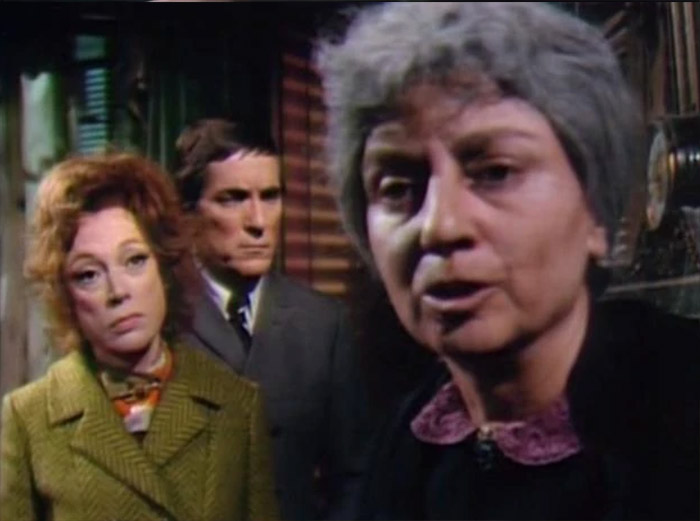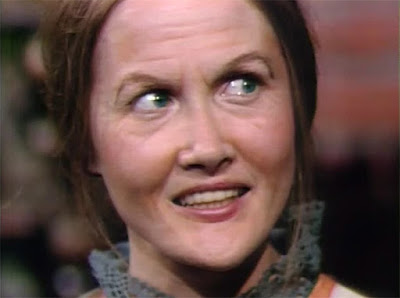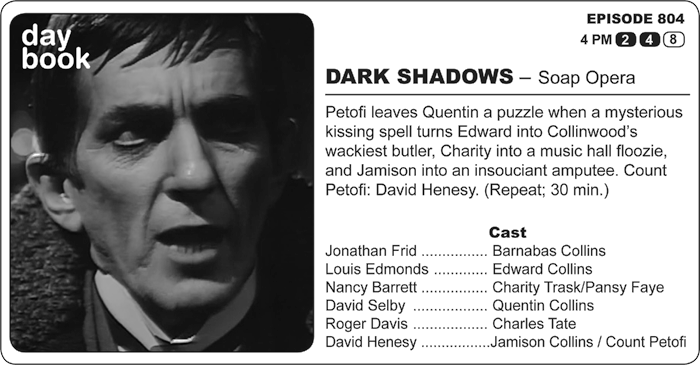
By PATRICK McCRAY
Taped on this day in 1970: Episode 1064
As Barnabas struggles in 1995 to assemble the clues of doomsday, Julia is preoccupied by a dashing ghost! Mrs. Johnson: Clarice Blackburn. (Repeat; 30 minutes.)
Julia reels from the psychic influence of Gerard as efforts to interrogate Carolyn about the disaster prove fruitless. The sheriff warns Barnabas and Julia to leave town, and if there were anyone else left alive, they’d smell torches and pitchforks, all the while wondering what would make pitchforks smell like that.
1995 is a fascinating mess. It’s a storyline that I want to shake by the lapels and ask it to be more. I mean, think of it… 1995! I’ve often bemoaned the lack of ray guns and mylar jumpsuits, and I’ve just as (at least once) often championed it for actually getting the era right, down to the 1970’s retro that Carolyn sports. It’s a vacation for most of the actors. Even though the majority of the original cast were absent for much of 1970 PT, they were missing from the show because they were shooting House of Dark Shadows. So, yes, they had a vacation coming. The upcoming Ragnarok storyline between 1995 and 1840 is a spare, modernist landscape where Roger is wholly missing and Liz might as well be. The post-apocalyptic wasteland of 1995 is a real slap on the backside from the OB/GYN to get us breathing in the real world.
 And it is a ‘real world’ in the most poetic sense. How long has Collinsport comparatively ignored the PTSD-inducing madness regularly unleashed by the town’s namesake? Not since Victoria first arrived on the train bound for the beginning and the end of the world has the town been so realistically wigged out by the Collinses. This a Lovecraftian afterbirth of a village. In the past, the reliable, economic bounty of the cannery kept the locals quietly grumbling thank-you-may-I-have-another, but with the family either dead or insane, I can’t imagine there’s much left of Collinsport. The house may be in ruin, but so’s the local economy. Things are so bad, they have to order out to get a sheriff from the south. Because we all know that Dana Elcar would have had the whole mess cleaned up, and would have bested the conspicuously Rubenseque Chuck Morgan in any number of contests involving wrestling oil, lobster bibs, or both. Yes, of course, nude.
And it is a ‘real world’ in the most poetic sense. How long has Collinsport comparatively ignored the PTSD-inducing madness regularly unleashed by the town’s namesake? Not since Victoria first arrived on the train bound for the beginning and the end of the world has the town been so realistically wigged out by the Collinses. This a Lovecraftian afterbirth of a village. In the past, the reliable, economic bounty of the cannery kept the locals quietly grumbling thank-you-may-I-have-another, but with the family either dead or insane, I can’t imagine there’s much left of Collinsport. The house may be in ruin, but so’s the local economy. Things are so bad, they have to order out to get a sheriff from the south. Because we all know that Dana Elcar would have had the whole mess cleaned up, and would have bested the conspicuously Rubenseque Chuck Morgan in any number of contests involving wrestling oil, lobster bibs, or both. Yes, of course, nude.There’s not a lot of story to tell in such ruin, and it shocks on myriad levels. Barnabas and Julia spend a lot of time wandering back and forth between Collinwood and Collinsport, looking for clues and finding few. Gerard shows up and starts staring at people, giving them the creeps, but that’s about it. In fact, I don’t know if I’ve ever watched a 1995 episode with my full attention, and yet it satisfies the inauguration of my favorite storyline, the mindbendingly fatalistic fall of Collinwood. None of it is fun, and all of it is finally truthful. Haunted houses are not sustainable real estate prospects and the idea that the Collinses could have lived in one for more than a month is an assertion that needs the pantsing the show gives it, here. The other shoe of reality has fallen hard, and I think it’s for golfing.
So, what are they spending their time doing? Talking. Grayson Hall has the unenviable task of the infectious nihilism that Gerard inspires. This is a Dark Shadows of the post-Manson era, when the deaths of soldiers in a senseless war were only an hour or so away on this station. America still had illusions of being a moral empire when Vicki arrived from New York. Not so much now, and this is a reflection. There’s not much to do, hunkered down like a dog under a bed after a thunderstorm, other than muse that the lawn was so much prettier before the tempest. And that’s what they do. Julia struggles with a very new form of invasion, here. Prior victimizers imposed evil on her. Her fear of Gerard feels different. This is a force that shows her the evil she has within her, and that’s a nauseatingly Zen attack. All Gerard need do is hold up a mirror and let Julia do the rest. Barnabas seems vaguely invulnerable to it because, as he speculates, he’s not human. All he is are evil impulses that he’s learned to dress up in the suit of goodness. Gerard seems to wisely keep his distance because of it.
The episode shines with Clarice Blackburn’s surprisingly warm misremembering of Collinwood before the fall. Is she inaccurate in her memory of that sunny, happy place? It’s true for her, even if it’s a lie she’s memorized so often that it eclipses the past. In a sense, she’s like a viewer of Dark Shadows who’s romanticized what she would like to have been the warmth in the Collins home that was all too fleeting. 1995, and episode 1064 in particular, is a chance to see another fan who’s let the wishes of memory color the reality of what was. It’s a creeping preview of a storyline that would be all too ready to show us that the center cannot hold forever, if it ever did.
This episode hit the airwaves on July 23, 1970.

